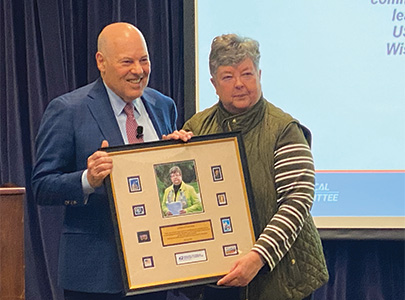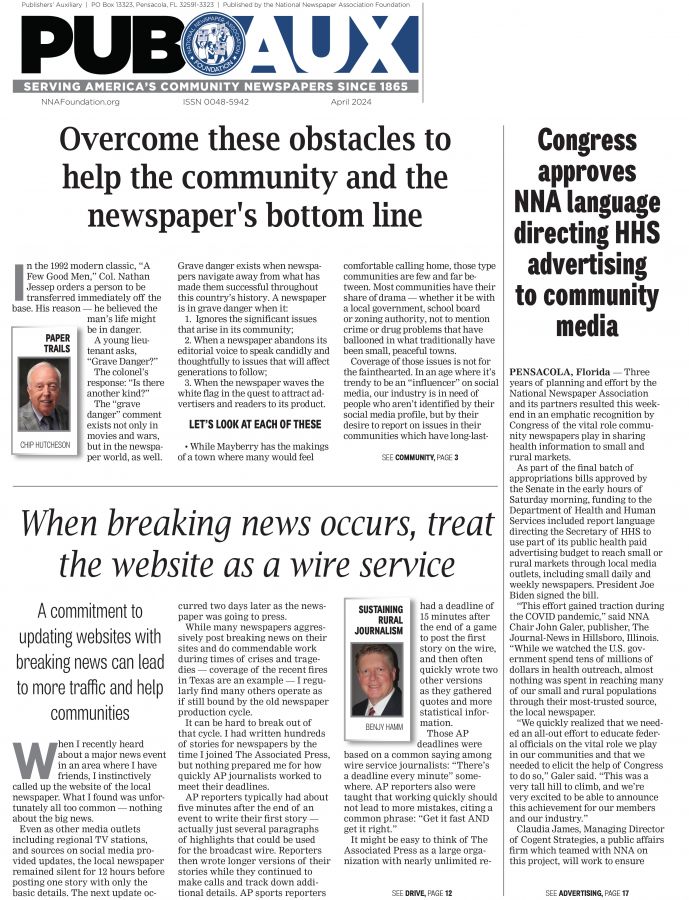Ways to make your computer run faster, safer this year
Mar 13, 2017
We’re off to a new and exciting start this New Year.
By Wilma (Melot) Newby
Computer Consultant | Oklahoma Press Association
We’re off to a new and exciting start this New Year.
Whether you’re optimistic or pessimistic about what 2017 holds, it’s here, and it’s time to make the best of it.
Many newspapers are in a holding pattern with their software and hardware because of Adobe’s leasing program. As older browsers die on the web, many newspapers are looking for solutions.
Let’s take a look at this. Most software companies have figured out that the best way to keep consumers coming back is by demanding a monthly lease plan. Instead of letting us purchase the software outright to run as long as we like without upgrades, we’re forced to pay a monthly fee.
Adobe and Microsoft are in a dead heat on this road. Adobe charges $20 per month for just the InDesign program. That’s great if you can use Gimp for Photoshop. But if you want the whole Creative Suite, it’s $50 per month. Microsoft offers its Publisher/Office suite for five computers for $12.50 per month. Although that leaves you using Gimp instead of Photoshop, it’s by far the cheapest solution. Also, Microsoft’s Publisher is only available for Windows computers.
QuarkXPress is still out there as a non-leased product. With the hope of getting some Adobe converts, Quark is offering one copy for $849 and a second copy for free, which drops the price to $424.50. Sounds good unless you own 20 workstations.
So what’s a small publisher to do? My recommendation is to buy an inexpensive computer for the internet to run side-by-side with the computer where all the pricey software is installed.
New computers from Apple and Windows distributors are available for under $500 and, if properly protected, will last for years. But if you’re looking to the future, get a higher quality machine that can run some form of cloud software.
If you don’t have plans to buy anything this year, let’s look at what you have and see if there is a solution to get you on the web without spending too much money. It’s possible to partition the hard drive of most computers with larger drives, which enables the machine to dually boot to either lower-end software or to newer software that runs the internet and email.
If you have a newer computer, say a 2010 or later, this allows you to learn new things without killing older soft- ware you need to get the newspaper out. In this mode, a server computer or network attached storage unit would be of great value.
When you have a newer computer, you can save all downloaded email to the server drive and reboot to the software side to put the newspaper together. This allows you to avoid permission problems for the files. Use a smartphone to check for incoming email after switching to the software side.
It is possible to use a smartphone for all email if you can save it somewhere on the network. However, a big screen is great for doing research on the web. This is an old trick used by developers to test new software.
Toughing it out with old stuff while learning about things like security certificates may be in your future.
Apple and Microsoft want us to use security certificates to make sure websites we’re downloading from are creditable. Owners of these websites have to purchase certificates from a company that is white-listed with Microsoft and Apple.
Without going into depth on what a security certificate is, I’ll just explain that when your computer goes out on the internet, it checks to see if a site is safe before you view or click on it. It’s a form of policing by the internet com- munity to protect us. It also keeps the maker of the website at least somewhat current with modern protocols. These little files tell us if the site is safe for credit card transactions, and if it’s safe to download art and ads.
Many end users get frustrated by the constant feedback from sites they have trusted for years. On some older browsers, this just doesn’t work and you get a screen saying the site is insecure or “get me out of here.” Those older browsers are having trouble with all the new protocols.
Web email becomes a real headache when the browser can no longer draw the pages because of these problems.
Another browser may be the answer, but if you’re on a Mac 10.5 or XP/Vista, it’s getting nearly impossible to over- come these problems.
Even Mac OSX 10.6 is becoming problematic—unless you’re using a tandem of Google Chrome and Firefox. This OSX is now more than 10 years old. Expect to see more problems on the web this year with 10.6.
You can use Keychain to set some of these security certificates defaults to always accept, which will hold the default on Macs.
CROSS TRAIN EMPLOYEES
This reminds me of something else all newspapers need—cross training. Use slow times of the year to train others. At least two people need to know how to run the circulation software, layout the paper and correct photos.
Slow times are also a good opportunity to update your customer information lists. Do you have email addresses and phone numbers? Is the list avail- able to more than one person? I’ve had newspapers lose all their sales contacts more than once this year. If your sales reps don’t want to share their list with everyone, have them print it out. Store the lists both on-site and off-site.
Backup your billing computer at least once a week with a small flash drive, say 16- to 32-GB. This should be enough space for both the circulation and accounting for a year. Make this a priority. You can get this size of a flash drive on Amazon or at other places for around $5. A better rated one might run around $8, but that’s well worth your peace of mind.
PASSWORD GENERATORS
The new year is also a good time to update and clean up passwords. Pass- word generators are an easy way to keep up with all of them.
LastPass 4.0 is top rated this year—and free. It saves all the sites that are frequented on any device you use. It shows up like a button in the browser toolbar. It can even fill out forms automatically. If you want the better version, it’s only $1 a month. You need Mac OSX 10.7 for the web browser part of the program. OSX 10.10 is needed for the application to run on the computer. For Windows computers, it goes by browser version. You need Internet Explorer 11, Firefox 2.0 and up, or Chrome 18 and up.
Another option is Dashline. Like the others, it runs on most platforms. You’ll need Mac OSX 10.10, or Windows Vista or higher for PCs. You can choose where the data is stored, which can be on your own local drive and then synced to the server. Dashline costs $40 per year with one free month. Although a bit expensive, security from a good company is priceless if you get hacked.
KeePass is open-source software that works in a little different way. It is an application that can be opened on almost any computer. It runs from a USB flash drive, so the program does not need to be downloaded on the computer to access it. The password list can be exported to a text file for backup.
Another option is RoboForm, which works with Mac OSX 10.6 and all the way back to XP on Windows computers. This makes it tops in many places. It offers the same good encryption software as the others and syncs to all devices it’s loaded on. It can fill out forms for you and is a password genera- tor. It’s available for $20 per year for all your computers and phones.
I personally think paying a little a year is worth it, no matter which one you choose. Maybe the company will last a little longer if they get some money.
Before you buy a password generator, see if your antivirus offers this option. Kaspersky keeps tracks of passwords on devices it’s installed on and, if you have it, it’s already paid for.
But the password keepers I mentioned are convenient and easy to use.
Wilma Newby’s column was brought to you by the Oklahoma Advertising Network (OAN). For more information on the OAN program, contact Oklahoma Press Service at 405-499-0020. Newby can be reached at wnewby@okpress.com. Reprinted with permission.














